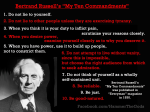The philosopher Bertrand Russell wrote his own personal set of ten commandments. They were published under the title “My Ten Commandments” in Everyman magazine in 1930.
They ran as follows: –
2. Do not lie to other people unless they are exercising tyranny.
3. When you think it is your duty to inflict pain, scrutinize your reasons closely.
4. When you desire power, examine yourself closely as to why you deserve it.
5. When you have power, use it to build up people, not to constrict them.
6. Do not attempt to live without vanity, since this is impossible, but choose the right audience from which to seek admiration.
7. Do not think of yourself as a wholly self-contained unit.
8. Be reliable.
9. Be just.
10. Be good-natured.
Years later he wrote another set of ten commandments, this one just for teachers. It was published in an article entitled “The Best Answer to Fanaticism – Liberalism” in the New York Times Magazine in 1951.
This set ran as follows: –
 1. Do not feel absolutely certain of anything.
1. Do not feel absolutely certain of anything.
2. Do not think it worthwhile to proceed by concealing evidence, for the evidence is sure to come to light.
3. Never try to discourage thinking for you are sure to succeed.
4. When you meet with opposition, even if it should be from your husband or your children, endeavor to overcome it by argument and not by authority, for a victory dependent upon authority is unreal and illusory.
5. Have no respect for the authority of others, for there are always contrary authorities to be found.
6. Do not use power to suppress opinions you think pernicious, for if you do the opinions will suppress you.
7. Do not fear to be eccentric in opinion, for every opinion now accepted was once eccentric.
8. Find more pleasure in intelligent dissent than in passive agreement, for, if you value intelligence as you should, the former implies a deeper agreement than the latter.
9. Be scrupulously truthful, even if the truth is inconvenient, for it is more inconvenient when you try to conceal it.
10. Do not feel envious of the happiness of those who live in a fool’s paradise, for only a fool will think that is happiness.
I am indebted to Kenneth Blackwell, editor of Russell: the Journal of Bertrand Russell Studies, for the sources of these quotes.
LINKS
Bertrand Russell writings on-line
Rochester Russell Set Schedule
Tags: Bertrand Russell, Ten Commandments

June 28, 2010 at 6:14 am |
can you please explain to subjectively the commandment no 7 that says “Do not fear to be eccentric in opinion, for every opinion now accepted was once eccentric”….I would gladly appreciate your immediate reply. thank you god bless
LikeLike
June 28, 2010 at 6:54 am |
Once in school, when I was age 12 or 13 – this would have been in 1949 or 1950 – our world history class had a guest talk from the high school physical education teacher, who had fought in Italy in World War Two. As background, he mentioned Mussolini’s invasion of Ethiopia, “which was a province of Greece.”
I raised my hand, and said that, no, Ethiopia was a country in Africa.
The teacher told me I was wrong, but, although I felt a little nervous, I didn’t back down, because I was sure I was right.
Finally we brought out an atlas, and – there was no Ethiopia on its map of Africa! I said that that what the map depicted as “Italian East Africa” was really Ethiopia. Finally the guest speaker noticed the city of Addis Ababa on the map, which he recalled having heard mentioned in connection with Ethiopia, and admitted I was right.
Afterward the regular history teacher told me that he had thought that Ethiopia was in Africa, but hesitated to challenge the authority of a war veteran.
So I learned from this that you should stand your ground when you have good reason to think you are right, based on facts and reason. The corollary to this is the willingness to change your ground, as the guest speaker did, based on facts and reason.
LikeLike
March 27, 2013 at 9:41 am |
[…] (via Phil Ebersole’s Blog) […]
LikeLike
February 28, 2014 at 6:12 pm |
[…] The philosopher Bertrand Russell wrote his own personal set of ten commandments. They were published under the title "My Ten Commandments" in Everyman magazine in 1930. They ran as follows: – 1. … They still apply, but years later he wrote another set for teachers – this set should be part of any course on leadership or managment: 1. Do not feel absolutely certain of anything.2. Do not think it worthwhile to proceed by concealing evidence, for the evidence is sure to come to light.3. Never try to discourage thinking for you are sure to succeed.4. When you meet with opposition, even if it should be from your husband or your children, endeavor to overcome it by argument and not by authority, for a victory dependent upon authority is unreal and illusory.5. Have no respect for the authority of others, for there are always contrary authorities to be found.6. Do not use power to suppress opinions you think pernicious, for if you do the opinions will suppress you.7. Do not fear to be eccentric in opinion, for every opinion now accepted was once eccentric.8. Find more pleasure in intelligent dissent than in passive agreement, for, if you value intelligence as you should, the former implies a deeper agreement than the latter.9. Be scrupulously truthful, even if the truth is inconvenient, for it is more inconvenient when you try to conceal it.10. Do not feel envious of the happiness of those who live in a fool’s paradise, for only a fool will think that is happiness. […]
LikeLike
January 19, 2022 at 1:14 pm |
[…] Bertrand Russellfs Ten Commandmentshttps://philebersole.wordpress.com/2010/05/21/bertrand-russells-ten-commandments/ […]
LikeLike